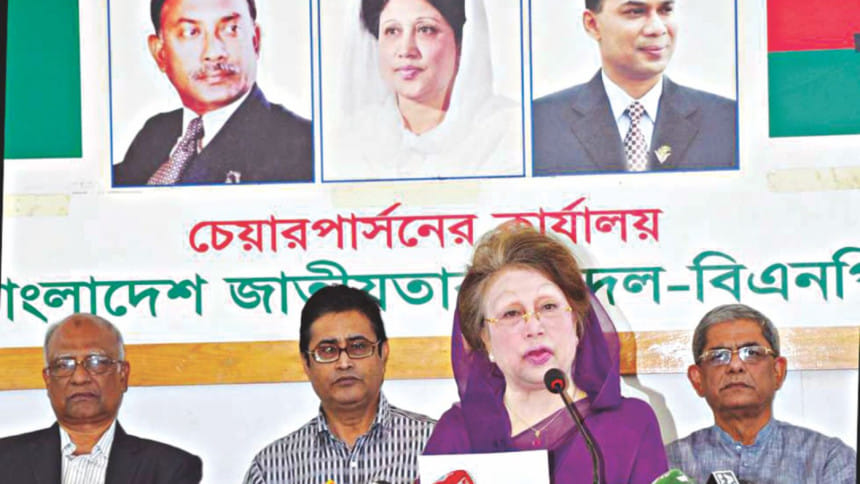PM returned empty-handed

Describing the prime minister's recent India visit as a “total failure”, BNP Chairperson Khaleda Zia yesterday said the PM returned home “empty-handed”.
If voted to power, the BNP would review all the “anti-state” deals and MoUs signed with India to protect the country's interests, she said.
“People regard the tour as an ultimate failure and also as one to give all and take nothing. The prime minister returned home empty-handed as she was only given some assurances.”
The BNP chief was addressing a press conference at her Gulshan office.
“People once again noticed that India's defence, political and geo-political dominance over Bangladesh would grow due to signing of treaties and MoUs in different areas, including security assistance and cyber crime, arms purchase, line of credit, assistance in nuclear project, import of diesel and power and increasing connectivity,” Khaleda read from a written statement.
She observed that all the deals and MoUs were signed by “giving priority to India's interests and proposals”.
Pointing to the PM's two meetings, one each before and after her India tour, with Islamic clerics, the BNP chief alleged that Sheikh Hasina held those meetings “to exploit the sentiment of the country's Muslim majority people”.
About the Tuesday's meeting between the PM and the Qawmi madrasa-based Islamic clerics, Khaleda said the premier herself “started doing religion-based politics”.
“In the past, she [Hasina] had signed an agreement with a religion-based organisation aimed at introducing Sharia law in the country and starting religion-based politics.”
On December 23, 2006, then AL general secretary Abdul Jalil had entered a five-point MoU with Bangladesh Khelafat Majlish, making a pledge that certified Alems (Islamic clerics) would be given the right to issue fatwas (Islamic rulings) if the Awami League-led grand alliance was voted to power.
The other points of the MoU include imposing a ban on enacting any law that goes against Qur'anic values, taking steps for implementing the initiative to recognise the degrees awarded by Qawmi madrasas and banning criticism of Prophet Muhammad (pbuh).
However, the AL was forced to scrap the deal after around two months following criticism from different quarters.
Mentioning about the January 5, 2014 national election, Khaleda said the then Indian government had “very grossly interfered into Bangladesh's internal politics ahead of the farcical election”.
She hoped the incumbent Indian government would overcome the “previous mistakes” and respect the sentiment of the people of Bangladesh.
She alleged that Hasina's tour could not yield any positive outcome on resolving the outstanding issues, including the Teesta water sharing deal, Ganges barrage project, border killing and removing tariff and nontariff barriers to Bangladeshi export products.
“Despite demand by the people, the prime minister didn't utter a single word about changing the site of the proposed Rampal power plant which would destroy the Sundarbans and the local environment,” Khaleda said.
The BNP chief claimed none of the deals and MoUs were signed protecting the national interests.
“They [the government] are only repaying the debt of their gratitude to India. In doing so, they are sacrificing the national interests and dignity. They have dented the country's sovereignty.”
She said although the PM was satisfied with the outcome of her tour, the people were “dissatisfied and worried about it”. “They didn't want so many anti-nation deals and MoUs as they only wanted to realise their dues.”
Khaleda said though the BNP had difference of opinions with the AL over many issues, her party favoured a common stance on protecting national interests, dignity and security.
“Had Sheikh Hasina played a strong role in upholding these issues, we could have unequivocally supported her role. Unfortunately, she [PM] totally failed to do so.”
She expressed concern over the defence MoUs signed with India, saying that the PM made Bangladesh “a part of India's military plan” through the signing of the MoUs.
The former premier said the government inked the MoUs ignoring the public opinion and opposition from political parties. “Like the people, we're also worried that there could be a long-term negative impact from it [MoUs].”
About the Hefajat-e-Islam's demand for removal of the Greek goddess' idol from the Supreme Court premises, Khaleda said the chief justice had the jurisdiction to make a decision in this regard.

 For all latest news, follow The Daily Star's Google News channel.
For all latest news, follow The Daily Star's Google News channel. 



Comments